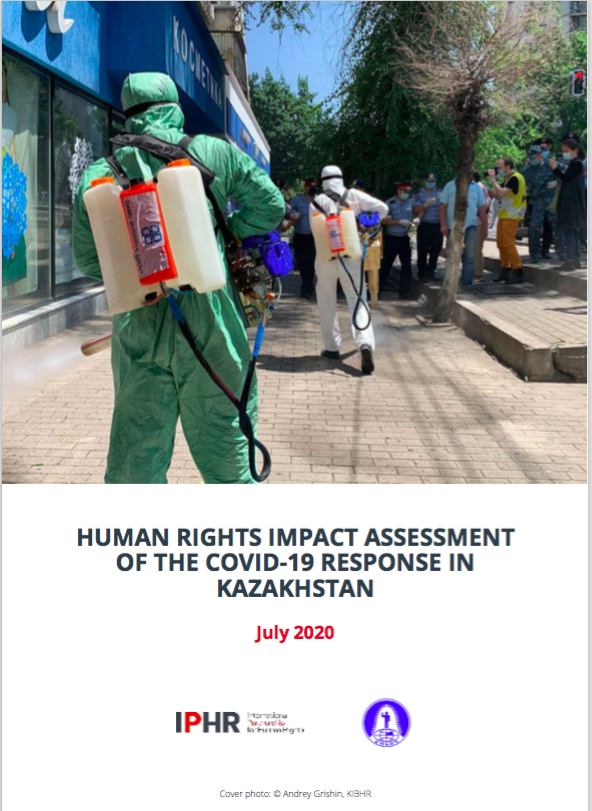From Our Member Kazakhstan International Bureau for Human Rights and Rule of Law (KIBHR), Kazakhstan – Human rights impact assessment of the COVID-19 response in Kazakhstan
14 August 2020 1:15 pm
Human rights impact assessment of the COVID-19 response in Kazakhstan

A briefing paper published by International Partnership for Human Rights (IPHR) and Kazakhstan International Bureau for Human Rights and Rule of Law (KIBHR) highlights key points on how the COVID-19 pandemic was handled in Kazakhstan from mid-March until mid-July 2020.
In response to the pandemic, Kazakhstan implemented a state of emergency starting from 16 March 2020, along with highly restrictive measures to limit the freedom of movement and other fundamental freedoms of residents. The national borders were shut, and the entry and exit points of most cities were closed. Within cities, movement by both vehicle and foot was also restricted. The authorities forcibly sealed off apartment blocks where some residents were found to be Covid-19 infected, resulting in that an unknown number of residents were not able to leave their homes for two weeks. The quarantine was lifted in early June, but re-instated in a less far-reaching format on 5 July.
Through our monitoring of the situation in Kazakhstan, we have also documented the following developments during the COVID-19 pandemic:
- During the state of emergency introduced in response to the COVID-19 pandemic, the authorities have adopted a number of amendments to national legislation, some of which have negatively affected the protection of fundamental freedoms in the country. In May, the president signed a new law on assemblies into force, in spite of widespread criticism of this law by both the local civil society and the international community. In a more positive development, the offenses of libel and slander were removed from the Criminal Code and transferred to the Administrative Code.
- Freedom of expression: Numerous people have been persecuted and prosecuted for exercising their right to freedom of expression and speaking out on the government’s handling of the pandemic. Among others, well-known civil society activist Alnur Ilyashev was convicted for expressing his opinion in this regard and given a sentence entailing court-imposed limitations on his freedom of movement.
- Freedom of association: During this period, the right to freely associate has continued to be seriously violated in Kazakhstan. In one particularly disturbing incident, a Nur-Sultan court banned a popular, unregistered opposition movement – the Street Party – as “extremist” in May 2020. Numerous people have been prosecuted for disseminating information about the movement, also prior to its banning.
- There were widespread reports of homeless people being mistreated by police or not provided with adequate support by the authorities during the quarantine, when whole cities were sealed off and movement was restricted.
- In a more positive development, the authorities provided modest financial support to citizens and businesses during the period of quarantine, especially supporting vulnerable citizens, who benefited from free food distribution.
- Civil society has criticised the failure of the authorities to ensure adequate conditions for incarcerated people during the pandemic and to adequately protect detainees and prisoners from COVID-19 infection.
- The education system in Kazakhstan has been seriously affected by the emergency measures introduced during the COVID-19 pandemic, as schools and universities were shut down and pupils transferred to distance learning from March until the summer break. As in many countries, the attempts to secure learning with the help of online platforms have had limited success.
- Incidents of domestic violence significantly increased in Kazakhstan during the Covid-19 lockdown. While the country’s crisis centres have continued to operate and provide support during the pandemic, victims have experienced difficulties in accessing help because of the restrictions of movement in place.
***
Please find the pdf version of this text here.
